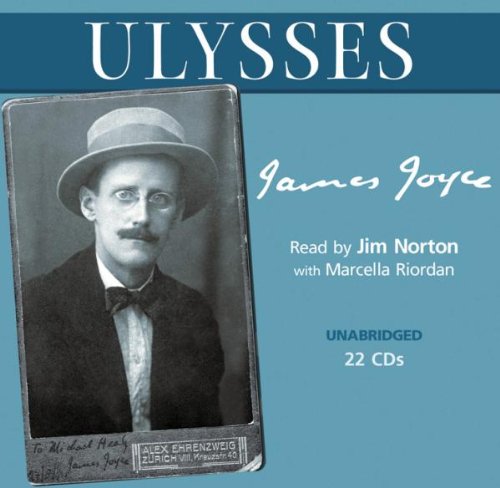
"Ulysses" is one of the greatest literary works in the English language. In his remarkable tour de force, Joyce catalogues one day - June 16, 1904 - in immense detail as Leopold Bloom wanders through Dublin, talking, observing, musing and always remembering Molly, his passionate, wayward wife. Set in the shadow of Homer's "Odyssey" and internal thoughts, Joyce's famous stream of consciousness give physical reality extra colour and perspective. This long-awaited unabridged recording of James Joyce's "Ulysses" is released to coincide with the 100th anniversary of degree Bloomsday. Regarded by many as the single most important novel of the 20th century, the abridged recording by Norton and Riordan released in the first year of "Naxos AudioBooks" (1994) is a proven bestseller. Now the two return - having recorded most of Joyce's other work - in a newly recorded unabridged production, directed by Joyce expert Roger Marsh.Ulysses has been labeled dirty, blasphemous, and unreadable. In a famous 1933 court decision, Judge John M. Woolsey declared it an emetic book--although he found it sufficiently unobscene to allow its importation into the United States--and Virginia Woolf was moved to decry James Joyce's "cloacal obsession." None of these adjectives, however, do the slightest justice to the novel. To this day it remains the modernist masterpiece, in which the author takes both Celtic lyricism and vulgarity to splendid extremes. It is funny, sorrowful, and even (in a close-focus sort of way) suspenseful. And despite the exegetical industry that has sprung up in the last 75 years, Ulysses is also a compulsively readable book. Even the verbal vaudeville of the final chapters can be navigated with relative ease, as long as you're willing to be buffeted, tickled, challenged, and (occasionally) vexed by Joyce's sheer command of the English language.
Among other things, a novel is simply a long story, and the first question about any story is: What happens?. In the case of Ulysses, the answer might be Everything. William Blake, one of literature's sublime myopics, saw the universe in a grain of sand. Joyce saw it in Dublin, Ireland, on June 16, 1904, a day distinguished by its utter normality. Two characters, Stephen Dedalus and Leopold Bloom, go about their separate business, crossing paths with a gallery of indelible Dubliners. We watch them teach, eat, stroll the streets, argue, and (in Bloom's case) masturbate. And thanks to the book's stream-of-consciousness technique--which suggests no mere stream but an impossibly deep, swift-running river--we're privy to their thoughts, emotions, and memories. The result? Almost every variety of human experience is crammed into the accordian folds of a single day, which makes Ulysses not just an experimental work but the very last word in realism.
Both characters add their glorious intonations to the music of Joyce's prose. Dedalus's accent--that of a freelance aesthetician, who dabbles here and there in what we might call Early Yeats Lite--will be familiar to readers of Portrait of an Artist As a Young Man. But Bloom's wistful sensualism (and naive curiosity) is something else entirely. Seen through his eyes, a rundown corner of a Dublin graveyard is a figure for hope and hopelessness, mortality and dogged survival: "Mr Bloom walked unheeded along his grove by saddened angels, crosses, broken pillars, family vaults, stone hopes praying with upcast eyes, old Ireland's hearts and hands. More sensible to spend the money on some charity for the living. Pray for the repose of the soul of. Does anybody really?" --James Marcus .
Read Ulysses (Naxos AudioBooks) complete books online for free. Reading Ulysses (Naxos AudioBooks) full free books online without downloading.
Looking up to the full article E-Books free download? Here you can read.
